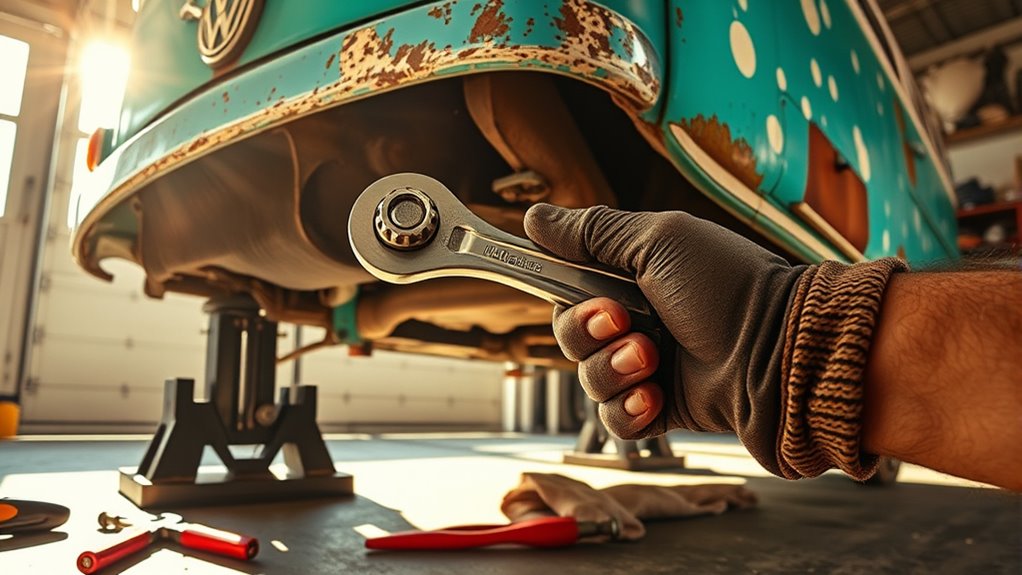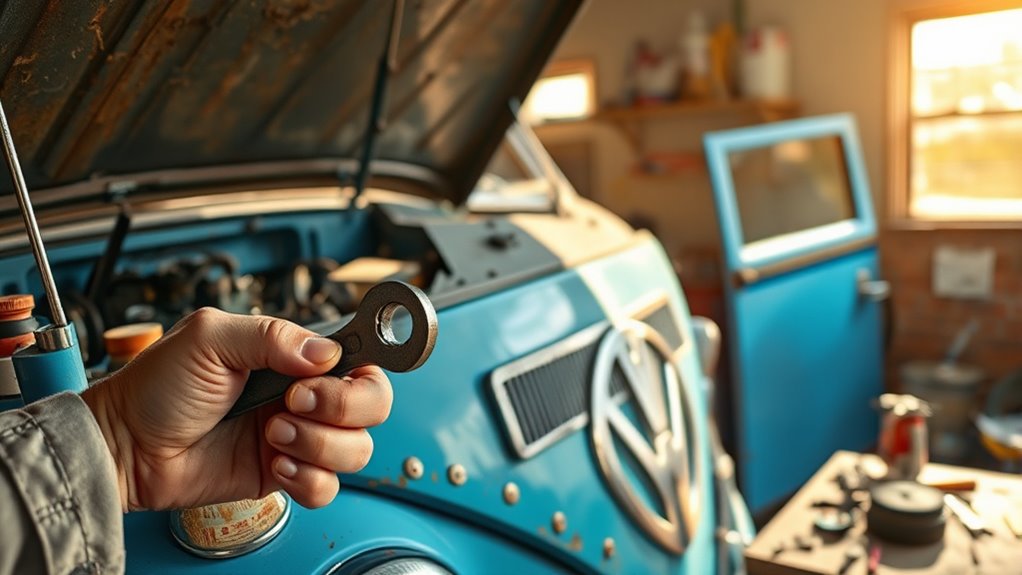Owning a VW bus pushes you to learn basic maintenance skills like changing oil, replacing filters, and checking tires. As you use the right tools and follow tutorials, you gain confidence and independence, making repairs less intimidating. Developing a routine and practicing patience help you grow more comfortable with wrenching. Soon, maintaining your bus becomes rewarding rather than overwhelming. Keep exploring these steps, and you’ll discover how transforming from a owner to a DIY mechanic is within your reach.
Key Takeaways
- Owning a VW Bus motivated me to learn basic maintenance skills, reducing reliance on mechanics.
- Regular DIY repairs boosted my confidence and deepened my connection with the vehicle.
- Investing in proper tools made troubleshooting and repairs more efficient and enjoyable.
- Developing a routine helped me identify issues early and maintain my VW Bus effectively.
- Patience and practice transformed wrenching into a rewarding and empowering DIY journey.

Learning to wrench might seem intimidating at first, but with patience and practice, you can develop the skills to tackle car repairs confidently. When you own a VW bus, you quickly realize that understanding basic car maintenance isn’t just helpful—it’s essential. The more you learn about your vehicle, the less you’ll rely on others and the more empowered you’ll feel. Starting with simple tasks like oil changes, replacing filters, or checking tire pressure gives you a solid foundation. As you become more comfortable, you’ll find that many repairs are within your reach, saving you money and giving you a sense of achievement.
Mastering basic maintenance builds confidence and independence in caring for your VW bus.
One of the most important steps in becoming proficient at car maintenance is tool selection. Having the right tools makes all the difference. You don’t need a garage full of expensive equipment, but a few quality essentials are worth investing in. A good set of screwdrivers, pliers, a socket wrench set, and a jack are fundamental. As your skills grow, you might add a torque wrench, brake bleeding kit, or a multimeter. When choosing tools, prioritize durability and compatibility with your VW bus’s specific parts. You’ll find that using the correct tools not only makes your work easier but also prevents damage to delicate components.
As you learn to wrench, it’s vital to understand the purpose of each tool and how to use it properly. Watching tutorials, reading repair manuals, or joining online forums can help you identify the right tools for each task. For example, when working on your VW bus’s engine or suspension, specialized tools like a spark plug socket or ball joint separator might be necessary. Knowing which tools to select and how to operate them safely enhances your efficiency and reduces frustration.
Over time, you’ll develop a routine that makes car maintenance less intimidating. You’ll start to recognize common issues and troubleshoot more effectively. Regularly scheduled maintenance becomes a straightforward part of caring for your VW bus, and you’ll gain confidence with each repair. Additionally, understanding essential oils for vehicle care or personal well-being can support your overall maintenance mindset. Remember, the key is patience—taking your time to learn each step, double-checking your work, and not rushing through tasks. With consistent effort and careful tool selection, you’ll find that wrenching isn’t just a chore; it becomes a rewarding skill that deepens your connection with your vehicle. Ultimately, owning and maintaining your VW bus transforms from a challenging task into a fulfilling DIY journey.
Frequently Asked Questions
How Do I Start Learning Basic VW Bus Maintenance?
To start learning basic VW bus maintenance, first, familiarize yourself with safety precautions to avoid accidents. Read the owner’s manual and watch tutorial videos to understand essential tasks like oil changes and brake inspections. Create a maintenance schedule to keep track of routine services, and gradually practice each task. Hands-on experience builds confidence, so don’t hesitate to ask for advice from experienced DIYers or mechanics.
What Tools Are Essential for a Beginner VW Bus Mechanic?
Did you know that 80% of vehicle repairs can be done with just a few basic tools? As a beginner VW bus mechanic, you’ll want to prioritize tool organization to save time and avoid frustration. Essential tools include a wrench set, screwdrivers, pliers, and a jack. Don’t forget safety gear like gloves and eye protection. Keeping your tools well-organized and safety gear handy guarantees you work efficiently and safely.
How Can I Find Reliable Repair Resources for VW Buses?
To find reliable repair resources for your VW bus, start by exploring online forums where experienced enthusiasts share tips and troubleshoot common issues. Additionally, invest in thorough repair manuals specific to your model, which provide detailed instructions and diagrams. Combining advice from trusted online communities with official manuals helps guarantee you’re working with accurate information, making your DIY repairs safer and more effective.
What Common Problems Should I Watch Out for in VW Buses?
Imagine cruising in your VW bus, feeling the wind, but watch out for rust issues that can quietly eat away at the frame. Keep an eye on the fuel system; leaks or clogs can leave you stranded. Regular inspections help you catch these problems early. By staying vigilant about rust and fuel system health, you keep your bus running smoothly and enjoy every adventure to the fullest.
How Long Does It Typically Take to Become Confident Fixing a VW Bus?
Becoming confident fixing a VW Bus varies, but with consistent practice, you’ll notice progress in a few months. Focus on vintage restoration and prioritize DIY safety, which boosts your skills and confidence. Start with simple repairs, then gradually tackle more complex projects. Hands-on experience, patience, and learning from your mistakes are key. Remember, every fix adds to your expertise, eventually making you feel comfortable handling your VW Bus like a pro.
Conclusion
So, you see, learning to wrench isn’t just about fixing your VW bus; it’s about gaining confidence and independence. Every challenge you face is a stepping stone, proving that you’re capable of more than you thought. Remember, Rome wasn’t built in a day, and neither did you become a master mechanic overnight. Keep at it, and soon, you’ll be turning wrenches like a pro. This journey shows that practice truly makes perfect.









